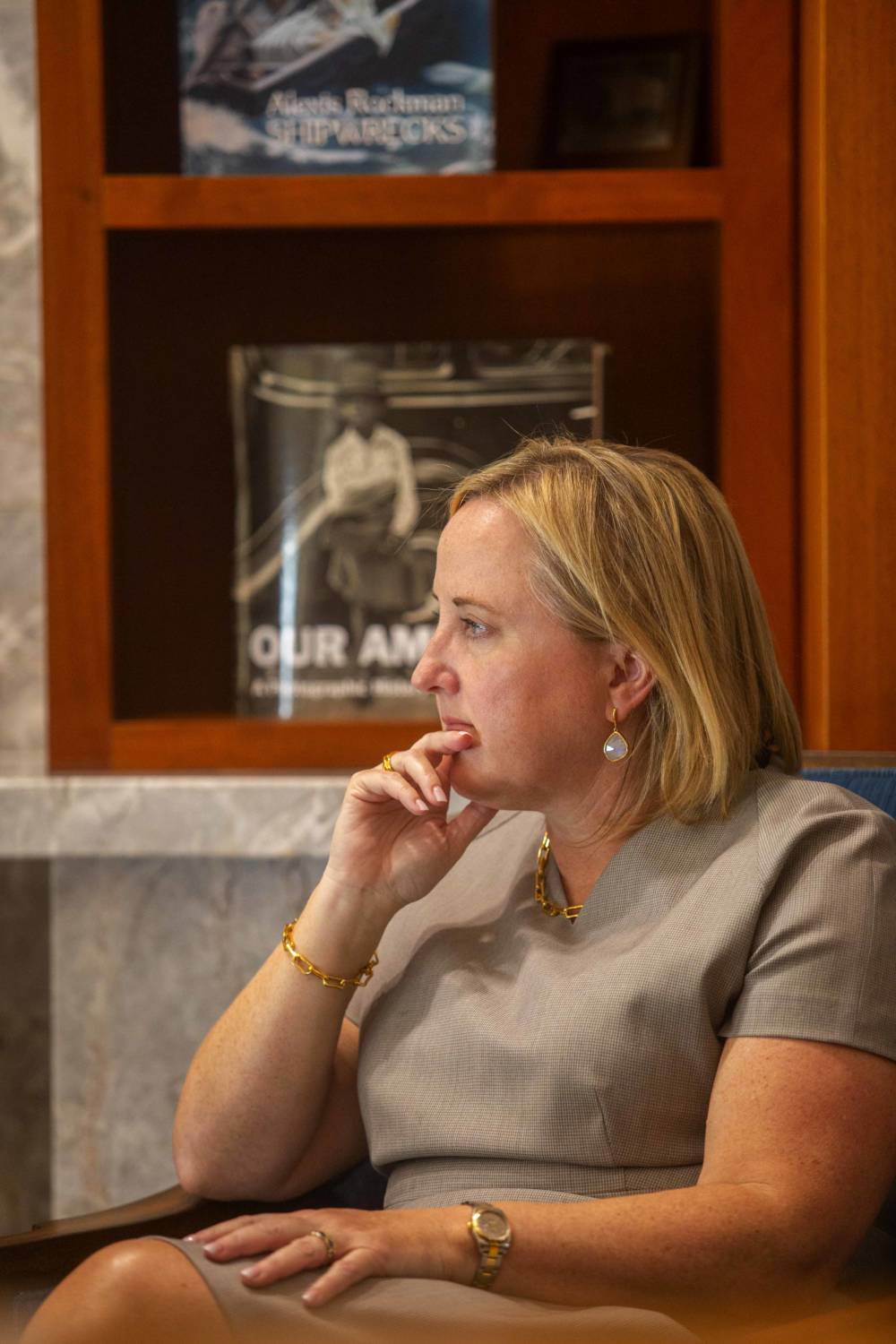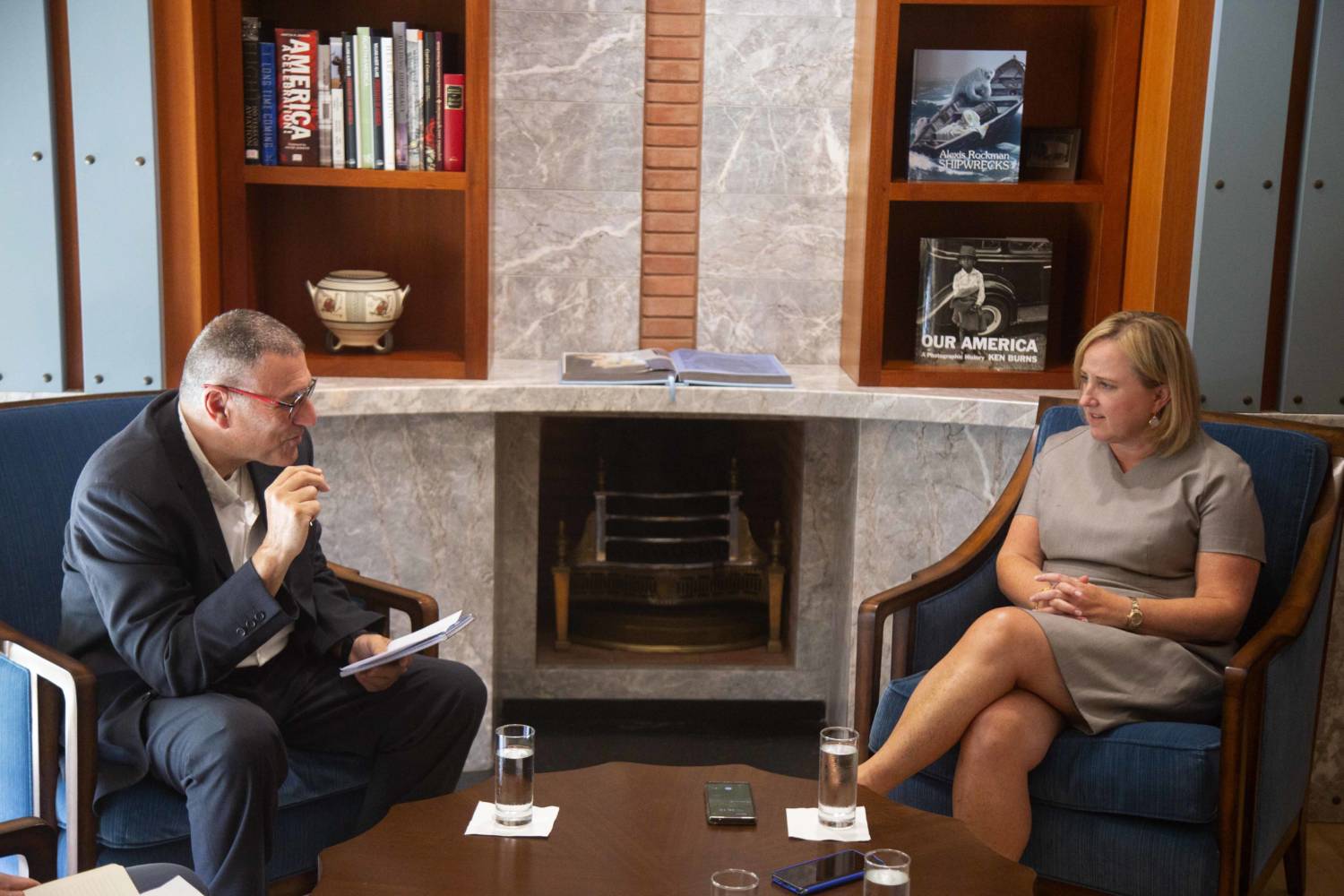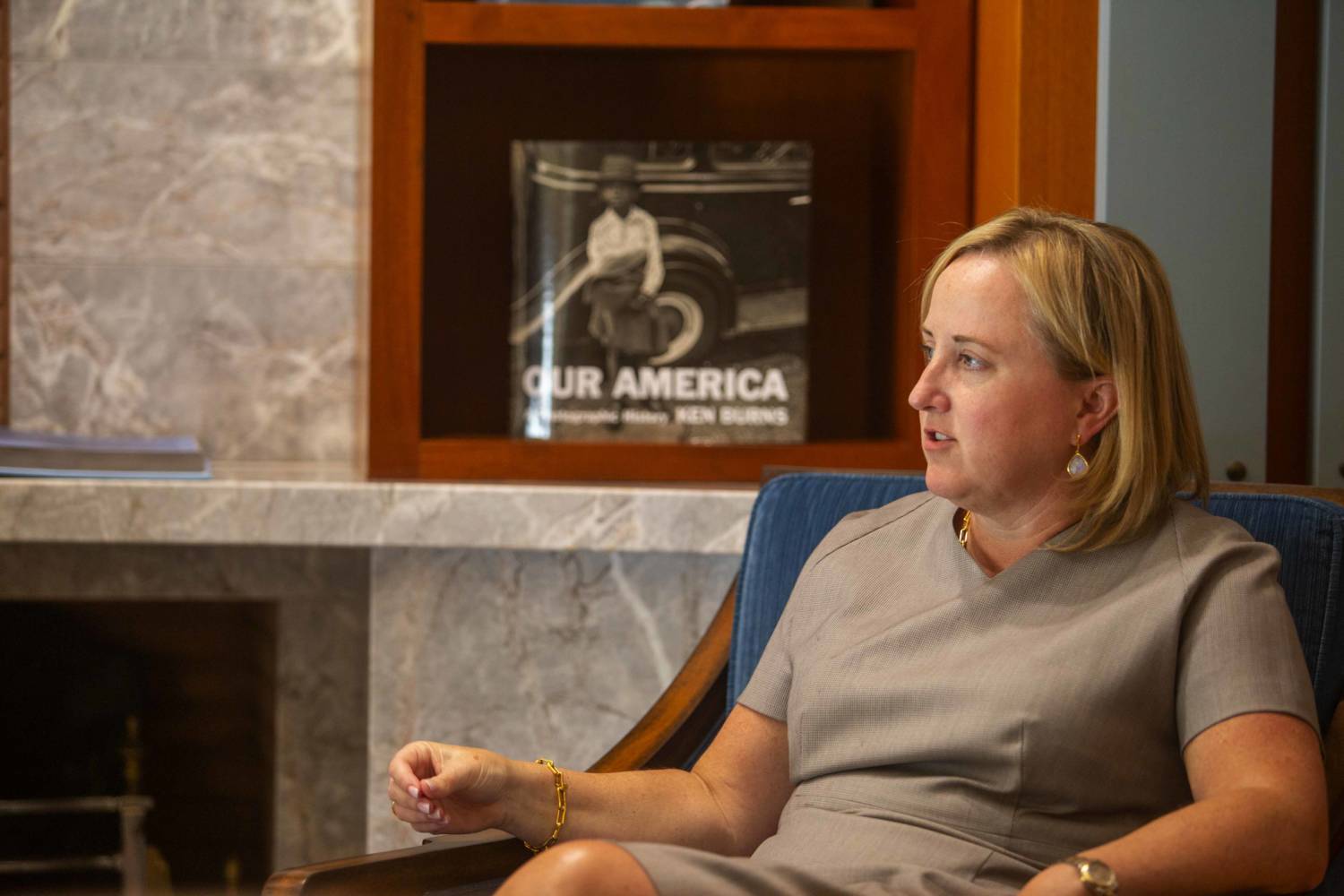The American and Russian embassies in Engomi, Nicosia are separated just by a few hundred metres, inadvertently symbolising Cyprus’ positioning in the international arena, where it has traditionally sought to strike an often challenging balance between Russia (or the USSR before 1991) and the West.
The current US Ambassador to Cyprus, Julie D. Fisher, assumed duties in February 2023, during a period of warming relations between the two countries, marked by the lifting of a decades-old arms embargo, joint military drills and a commitment by the new Cypriot government to comply with sanctions against individuals and entities based on the island who are believed to have facilitated people connected to funding Russia’s war in Ukraine, hide their assets.
In an interview with Phileleftheros and in-cyprus, Ambassador Fisher says that the actions of the new government have spoken very clearly about Cyprus’ alignment with the transatlantic consensus, adding that the sanctions are having a real impact on Russia’s ability to wage the war in Ukraine.
She further notes that going forward, countries should think about how they can best protect their financial systems and the integrity of their markets, with investment screening being an option.
Interview with Andreas Bimbishis and Stelios Marathovouniotis.
The general feeling here is that the message delivered from the United States to Cyprus is that either you cooperate with us on the sanctions or you’ll find yourselves in trouble. Is that right?
I think it’s important to take a step back and talk about the context for these new designations that we have announced in the last 45 days or so. The context that is absolutely essential to understanding these designations, is actually the point of what we’re trying to get done with the sanctions. We: the USA, the G7 and the transatlantic community are all working to bring about an end to Russia’s war in Ukraine. That is the number one goal of these efforts. And in last weekend’s meeting of the G7 leaders in Hiroshima, we saw a clear set of messages emerge about the commitment of the West to do everything we can to cut off the fuel that the Kremlin is using to continue to wage this war in Ukraine, the resources that Russia needs to field more soldiers on the battlefield, the fuel that the Kremlin needs to field more equipment on the battlefield, the semiconductors that Russia needs.
All of this is what is allowing the atrocities that we are watching unfold and have been watching unfold since February 2022. The theft of Ukrainian children, the torture in Bucha, the atrocities in Mariupol. These are war crimes that we have seen, that we have designated specifically as war crimes.
Ending Russia’s ability to wage this war is in the interest of the entire transatlantic family. And that is where we have found the hand of President Christodoulides and of Cyprus, as a member of the transatlantic community, as a member state of the European Union, and as a bilateral partner for the United States. President Christodoulides and his ministers have been very clear about where Cyprus stands with regard to this war. I have greatly appreciated the conversations that we have had with members of this administration. I have appreciated the chance to talk through what we are trying to accomplish.
We are not trying to target Cyprus or Cypriot persons or entities. What we are trying to do is go after networks, we are going after oligarchy networks, Kremlin-controlled networks and those that are enabling the illicit finance regime, the money laundering, the sanctions evasion. Fundamentally, this is what we are trying to find. If you look at the sanctions that have been announced on April 19, that affect Cyprus more directly, you will see that we designated, I believe, 15 individuals and 18 entities, but that was part of a much larger list of 144 persons and entities across 23 countries. The main announcements last Friday (May 19) were about 200 persons and entities in 20 countries. So again, it’s not about Cyprus and Cypriots. It’s about the networks. And it’s about the way that these networks have very nefariously utilised access to international financial institutions.
Should we expect more sanctions in the future?
I’ll go back to my point about the purpose of the sanctions. As long as Russia continues to prosecute this war, we will continue to go after those networks that add fuel to it. Again, our hope is that the impact of what we’re doing, not just with the financial tools, but about what we are doing in support of Ukraine, to help Ukraine survive economically, is about right. There’s a wide range of tools that the G7, the transatlantic community and others have brought to bear. The sooner this war ends, the sooner we will see an end to future designations rounds.
Before the elections in Cyprus, there was anxiety from Western countries that the new President could be friendly to Russia. To what extent are the sanctions used as a diplomatic tool to move Cyprus closer to the West and farther away from Russia?
The decisions of this government, the decisions of the new President and his Ministers have spoken very clearly about alignment within the transatlantic consensus within the European Union. And on our part, obviously, that is incredibly welcome. The sanctions, again, have a very specific purpose. And it is ending the war. It’s not a tool, it is not a chess game in this respect with various members of the transatlantic community, which we are a part of ourselves. It is about those networks and going after those networks. So, what I’ve appreciated so much is the opportunity to have very direct conversations with the government to talk about what it is that we see, to share information, to receive information. That coordination, that collaboration, is really welcome and is perhaps a change from what we might have found in the past. But I think this is one more area where the United States and the Republic of Cyprus have been growing closer over many years, not just in recent weeks or months, but over many years.
What impact have the sanctions had on Russia?
There’s no question about the impact of the sanctions. At the beginning of this war, Russia had somewhere in the neighbourhood of 800+ billion US dollars in reserves. Right now, cash on hand is something like 200 billion. We have seen a dramatic impact on their ability to access chips, semiconductors, the equipment they need to prosecute this war, their ability to buy and replace lost military equipment, their ability to hire new soldiers. We have seen the impact is felt in Russia. And we know this is taking effect.
Have the sanctions affected people in Putin’s inner circle?
They are very directly impacted. Their ability to access their wealth, to utilise the wealth which the Kremlin has allowed them to have; the very nefarious scheme of the Kremlin, which is to take state wealth and put it in the hands of people who are politically loyal, and then expect them to use that wealth for the state’s purposes. It is part of this very malign activity, this very malign influence that the Kremlin has been exerting for years. And yes, we are seeing the oligarchs very directly impacted. Their ability to continue that activity has been degraded, their access to the West has been disrupted to a large extent. Again, we will continue to look for ways to disrupt those networks.
Before the war in Ukraine, Cyprus was heavily reliant on Russian money, either through tourism or financial services. In the past couple of years, there have been efforts, to replace this inflow of money with investment from other countries. Could we see more US investment in Cyprus in the future, or is the US encouraging other countries to invest here?
One of the incredibly important qualities of the Western financial model, of the EU’s financial model, of our model in the United States is that investment decisions, trade decisions are driven by market forces. What we have seen in terms of the United States and the Republic of Cyprus is a growing trade relationship, a growing economic relationship, again, driven by economic choices, by economic actors, not driven by the direction of the government. We’re going to do everything we can to enhance that, we’re going to do everything we can to bring people together to see the opportunities that exist between businesses on both sides of the Atlantic, and what more can be done and what additional opportunity can be unlocked in Cyprus. And I think there’s a tremendous amount of interest on both sides of this relationship.
The question of replacement, if you will, of whether it’s tourists or assets, deposits from Russia, I would say Cyprus has shown itself to be incredibly agile and has shown itself to be really quick to evolve. I look at the response at where Cyprus is post-COVID. And I look at how quickly, the economic situation has rebounded here. I look at the ways in which European tourists have really flooded to Cyprus and have been anxious to return in the last year or two years since travel has reopened. And, you know, I look at a country that should be incredibly confident. And its ability to attract investment, tourists, visitors of all kinds. I think that’s easy work.
How worried are you about Chinese money flowing into Cyprus?
This is another area where the G7 leadership is really important. Our leaders talked last weekend about de-risking when it comes to thinking about the People’s Republic of China. The question for all of our countries is thinking about how we avoid it. If we acknowledge that Russia’s abuse of our financial systems, and its access to our financial systems, had some very deleterious effects on our economies, then how is it that we can protect ourselves from making a similar mistake again?
I think these are the kinds of questions we need to ask ourselves. And so part of that is about investment screening and moving forward on investment screening mechanisms that are in the process of evolving. Cyprus has considered investment screening. And I think it’s an issue that hasn’t quite crossed a finish line yet. But again, the question is how we best protect our financial networks, how do we best protect citizens?
And data privacy is such an important concern in Europe, we certainly know that from the United States, thinking about what information is shared, how much and with whom, again, recognising that the People’s Republic of China, these are not purely economic decisions that have been taken about investments, is part of the consideration.
So we should be careful not to open up to Chinese investment, to not find ourselves in the same situation as now with Russians?
Well, that’s what you said, that’s not what I said! My point is that we have a lot of lessons to learn from the last 30+ years, considering some of the agreements that were made between Cyprus and the Soviet Union, in the 80s. So, the question of thinking about how, on a domestic basis, Cyprus considers its own legal structures, as well as how the European Union thinks about the potential risk and screening mechanisms, there’s a lot that can and should be learned. There’s a lot, for all of us to do together in terms of sharing the benefit of our own experiences. And again, about protecting the integrity of our markets going forward.
Some people have accused the government of opening up its archives, its data banks for the Americans to go through. How do you respond to this?
Let me describe how governments share this kind of information. We are sharing information back and forth, every single day, on a huge range of subjects that are of mutual importance. And so when it comes to designated individuals, for example, there are requests in both directions. Sometimes this information, it’s about publicly available information. Sometimes it is government information. And so we have appropriate channels for sharing that information. I would characterise the level of cooperation as really robust.
Do you think this is the end of the road for the shadow economy that has developed in Cyprus which facilitates the hiding of assets, not just for Russians but for citizens of any country?
I believe the government is quite serious about ensuring the integrity of Cyprus’ institutions and its reputation. These are efforts that take time and commitment. They’re not just it’s not a light switch that turns on and off. It takes a concerted effort by many, inside the government, in the professional associations, in the banks. It takes a tremendous amount of concentration and focus, and partnership, again, inside the European Union, partnership with other trusted partners. I see Cyprus making the decisions that change those perceptions, its reputation. I see the President speaking clearly on this. I see the Foreign Minister. So I think it will have an impact. I think it will change those perceptions.
What lies in the future of the US-Cyprus relationship?
I’ll tell you this: President Christodoulides has really challenged me, has challenged the United States to say: let’s make this relationship one that provides concrete results for our citizens. And I just couldn’t agree more. He is absolutely right. That is ultimately what every bilateral relationship should be about, what are we getting done for our citizens? And so, in the case of this relationship, I think we have the opportunity to expand in ways that are very meaningful for the citizens of our two countries, in ways that are beneficial for our security, in ways that are beneficial economically, in ways that are beneficial in security and law enforcement. There are people-to-people ties, there’s the number of Cypriots, Americans studying in each other’s universities. There are the unmistakable family ties between so many Cypriots and Americans. There is so much room for us to do more. And so I think that’s what you can look for in the relationship.








